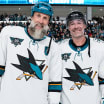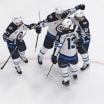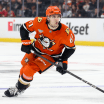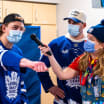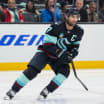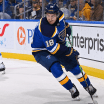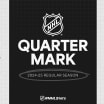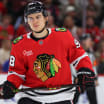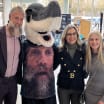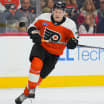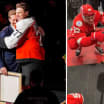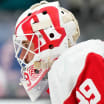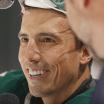Legendary hockey reporter Stan Fischler writes a weekly scrapbook for NHL.com. Fischler, known as "The Hockey Maven," shares his humor and insight with readers each Wednesday.
This week Fischler shares an interview with Adam Oates, who is eighth in NHL history with 1,079 assists and 20th all-time with 1,420 points. Oates played 19 seasons with the Detroit Red Wings, St. Louis Blues, Boston Bruins, Washington Capitals, Philadelphia Flyers, Anahaeim Ducks and Edmonton Oilers. He was inducted into the Hockey Hall of Fame in 2012 and named one of the 100 greatest NHL players in 2017.
This interview originally appeared in Fischler's book, "Hockey Stars Speak."
Oates says college opportunity spurred Hall of Fame career in NHL
Self-described 'late bloomer' is 8th all-time with 1,079 assists
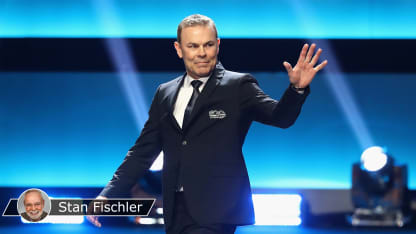
By
Stan Fischler
Special to NHL.com
How old were you when you started playing organized hockey?
"I was four years old and the team was called Burt Robinson Flyers, a city team in Toronto. I had to get up early in the morning to get to the rink. My dad would dress me at home and I would sleep in the car on the way to the rink. My mother and father invested an amazing amount of time on my hockey growth. My dad had the biggest effect. He was a civil engineer out of England who worked for a big Toronto cement company. I knew as a kid that he'd always be at my games and -- when I needed it -- he'd be available to drive me to the rinks. He was an unbelievable help to me and frankly, looking backward, I don't know how he did it."
Who were your NHL idols when you were growing up?
"I got my inspiration from the Chicago Blackhawks. Bobby Hull and Tony Esposito were my favorite players with Toronto's Darryl Sittler as another one at the top. All I really wanted to do for a living was be a professional hockey player like them. But I knew early on that it would take a lot of work and that's why I played as much as I could. In fact there were years when I played on two different teams at the same time. My old brother also played. One way to improve myself was to play against his friends who were older and better than I was. Anything to get better was the way I looked at it."
How would you describe your progress as a player?
"I was a late bloomer and, as a result, I wound up playing in leagues where nobody really got scouted. I played Tier 2 with (future NHL forward) Steve Thomas. Both of us were in the same boat in that we didn't get any attention. I was slow and was not really an attractive player for a scout. And that may explain why I wasn't even drafted. In fact it wasn't until I was 19 years old that I finally got a nibble and then, finally, things began to change for the better in terms of my hockey growth."
What happened?
"A scout from Rensselaer Polytechnic Institute, the engineering college in Troy, New York, this particular bird dog had seen me playing Tier 2. One day, he told me, 'You got some talent.' Then he talked to my coach and suggested that I go to RPI. I was tickled when I heard that and then I heard from RPI's coach, Mike Adessa. He said, 'We'll give you a scholarship if you go back to school and get your grades.' So I went back to school, got my grades and finally entered RPI. But I can tell you this, that was no breeze, juggling academics with hockey at a tough school like RPI. I had to take courses like calculus that I never would have passed if I didn't have tutors."
How did it all work out?
"I eventually figured out the collegiate routine. Meanwhile, the hockey part became unbelievably good for me. We had a great rink and our team was ranked all three years. We filled our building and everywhere we played, we sold out. It was awesome and it helped that I had some teammates who also eventually would make it to the NHL. One was the goalie Daren Puppa,as well as Ken Hammond and John Carter. Still, I wasn't satisfied with my game, especially my skating. During the summer my coach had me study power skating in Boston with a guy named Paul Vincent. He helped big time and, at that point, things were looking up."
Pinpoint the big break?
"One of the highlights of my life was RPI winning the NCAA championship (in 1985). Right after that, my life turned into a whirlwind. About 15 NHL teams approached me because I was a total free agent. It was wild, like an auction and, finally, it got down to five NHL teams -- Rangers, Islanders, Washington (Capitals), Minnesota (North Stars) and Detroit (Red Wings). It didn't matter to me who I played for although I leaned toward the Rangers. The auction was on and, at the last second, Detroit sweetened the pot and I signed with the Red Wings. It was mainly a money thing and what was great about it was that my family got to be there and my dad, who had been such a big part of my development, was able to be part of this big event in my life."
You were lucky that the RPI scout saw enough good in your game to get you a scholarship?
"I'm so glad I went the college route, especially since I had so many memorable moments. One of the best came during a game with Minnesota-Duluth when we were down by a goal with only 10 seconds left in regulation time. We not only tied it but the game went into three overtimes before we won. I got five assists in that one and it proved to be the stepping stone to my professional career. I had good seasons in Detroit but in June 1989 I got traded to St.Louis. At first I was devastated but once I settled in with the Blues, everything worked out."
What was the highlight of being with the Blues?
"It turned out that I got to play alongside one of my best friends, Brett Hull. That was as good as it gets. Think about it, as you get older, you really don't get to spend that much time with your best friends. People get jobs and move away; that sort of thing. But my luck, here I am with 'Hullie' and we're playing together, 30 minutes every night, scoring a lot, laughing, going out every night and just having a blast. There I was feeding the best goal scorer in the League."
Your illustrious career included induction into the Hockey Hall of Fame and it all began with your dad's devotion to your hockey life. Did he ever deliver an important message that inspired you on your journey?
"Because he had put in all those years to help me as a player, my success was a way of Dad now getting something back. I'll always remember what he told me a long time ago that helped me as a player: 'If you can be unselfish, your teammates will always like you.'"


